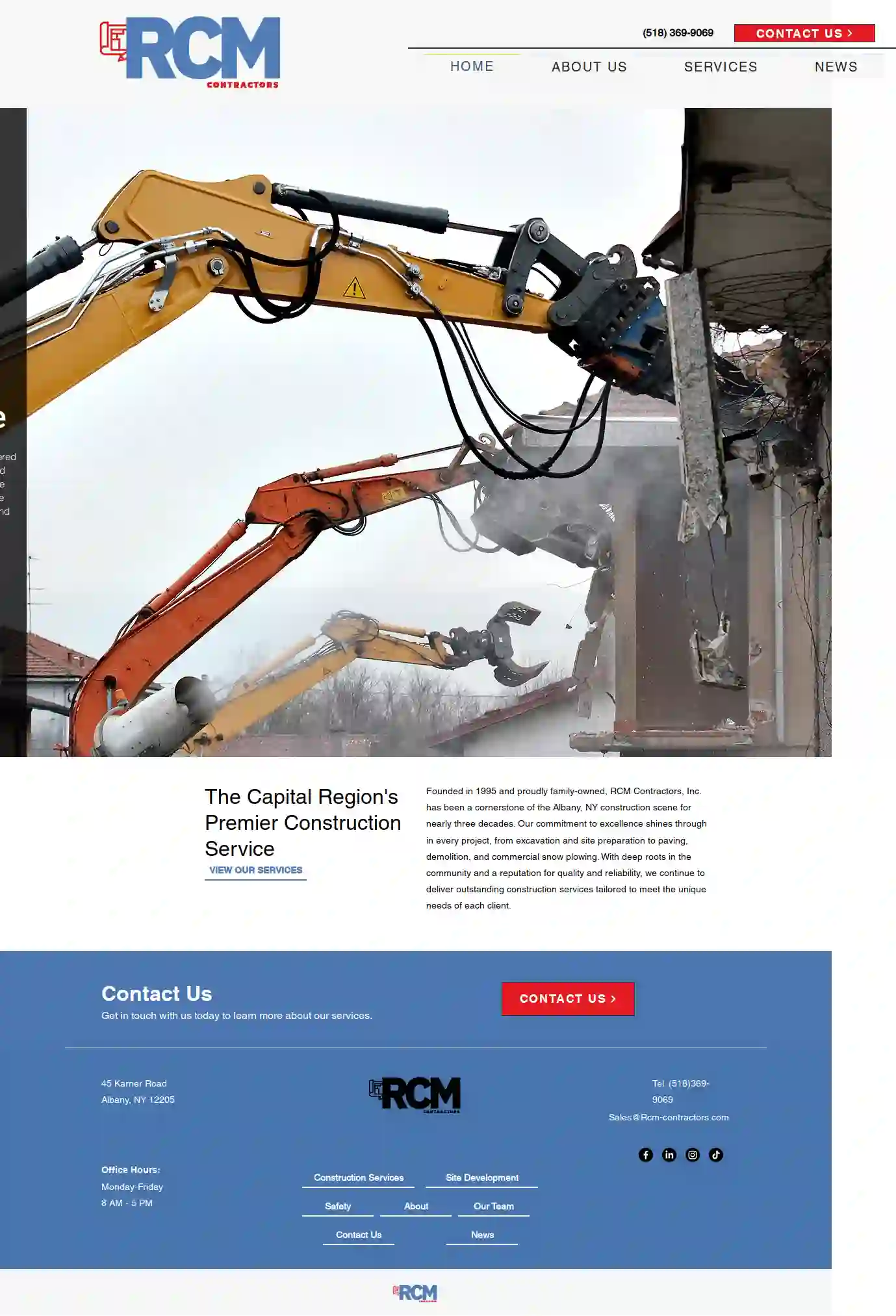Excavation Contractors Albany
Find Excavation Contractors in Albany
Receive up to 3 Excavation Company Near Me quotes for your project today! Compare profiles, reviews, accreditations, portfolio, etc... and choose the best offer.

J Ellrott Excavating
3987 Albany Street, Schenectady, 12304, USJ. Ellrott Proudly Services Homeowners & Businesses in the Capital Region → Drain Cleaning → Installations & Repairs → Plumbing → Excavation → Inspections → & More Three Generations Strong for Over 50 Years A Family-owned Local Water, Sewer, Septic, and Drain Company for Over 50 Years FREE ESTIMATE We specialize in residential and commercial/industrial drain cleaning and drain maintenance services. PROFESSIONAL GRADE DRAIN CLEANING Emergency and pre-scheduled maintenance Trenchless Installation Install your water or replace your sewer without destroying your lawn or driveway! SEWER, SEPTIC, DRAIN INSPECTIONS Our expert technicians have unmatched professionalism to help our customers avoid problems and discover issues before they become substantial. INSTALLATIONS & REPAIR Our water, sewer, plumbing, and drain cleaning services are committed to excellence and our goal is to keep your installations and repairs working efficiently in the years to come. EXCAVATING Whether you’re a residential or commercial/industrial customer, our 50 years of experience will provide you with extensive excavation services for projects large and small. ADDITIONAL SERVICES: Line Location/Inspection, Trenchless Repair/Installation, Leak Detection LEARN MORE
- Services
- Why Us?
- Gallery
Get Quote
Albany Excavation and Concrete
54 reviews1234 Winchester Blvd., Campbell, USAlbany Excavation and Concrete A Division of A.P Concrete LLC Albany Excavation and Concrete services Albany, Troy, Schenectady New York and surrounding areas. Make us your first call for all things stamped concrete, retaining walls, concrete steps, residential drainage....you name it! When you call us you get Free Estimates Skilled tradesmen Value oriented pricing And finished product that will last! Call Us Today for a FREE Estimate!
- Services
- Why Us?
- Gallery
Get Quote
RCM Contractors Excavation, Demolition & Land Development Albany
45 Karner Road, Albany, 12205, USOur Story Founded in 1995 and proudly family-owned, RCM Contractors, Inc. has been a cornerstone of the Albany, NY construction scene for nearly three decades. Our commitment to excellence shines through in every project, from excavation and site preparation to paving, demolition, and commercial snow plowing. With deep roots in the community and a reputation for quality and reliability, we continue to deliver outstanding construction services tailored to meet the unique needs of each client.
- Services
- Why Us?
- Gallery
Get Quote
DIRT BOSS Excavating
53 reviewsAlbany, USAbout YouTube Our mission is to give everyone a voice and show them the world. We believe that everyone deserves to have a voice, and that the world is a better place when we listen, share and build community through our stories.
- Services
- Why Us?
- Gallery
Get Quote- Ni
Nick Lussier's Excavating, LLC
58 reviewsAlbany, US- Services
- Why Us?
Get Quote 
Albany Excavation and Concrete
Albany, US- Services
- Why Us?
Get Quote
Badolato Excavation
4.944 reviewsAlbany, US- Services
- Why Us?
Get Quote- Ja
Jake Burnett Excavating Inc
4.69 reviewsAlbany, US- Services
- Why Us?
Get Quote - Ex
Excacvation Albany NY
Albany, US- Services
- Why Us?
Get Quote
Over 22,076+ Excavation Companies onboarded
Our excavation contractors operate in Albany and surrounding areas!
ExcavationHQ has curated and vetted the Best Excavation Contractors arround Albany. Find a top & reliable pro today.
Frequently Asked Questions About Excavation Contractors
- Soil Type and Stability: Stable, cohesive soils allow for deeper excavations than loose or unstable soils.
- Groundwater Level: Excavations below the water table require dewatering techniques to manage water intrusion.
- Equipment and Resources: The size and capabilities of excavation equipment influence the achievable depth.
- Safety Regulations: OSHA and other safety regulations impose limitations on trench depths without proper shoring or sloping.
- Project Requirements: The purpose of the excavation (basement, pool, foundation) determines the necessary depth.
- Excavations Deeper Than a Certain Depth: This varies by jurisdiction, usually around 5 feet.
- Excavations Near Utilities: Digging near buried utilities (gas, water, electric) often requires permits and utility locates to prevent damage.
- Excavations Affecting Public Property: Projects impacting sidewalks, roads, or other public areas typically require permits.
- Excavations in Environmentally Sensitive Areas: Projects in wetlands, floodplains, or other sensitive areas might need special permits.
- Topsoil Removal: Stripping the fertile topsoil layer from a site, often preserving it for landscaping.
- Trench Excavation: Digging long, narrow trenches for utilities (pipes, cables) or foundations.
- Basement Excavation: Removing earth to create a space for a basement beneath a structure.
- Pool Excavation: Digging a precise hole for installing a swimming pool.
- Roadway Excavation: Removing earth and preparing the ground for road construction.
- Demolition Excavation: Clearing debris and preparing the site after demolition.
- Channel Excavation: Creating channels for drainage or irrigation.
- Determining Soil Suitability: Assessing whether the soil can support the intended structure or load.
- Recommending Foundation Types: Advising on the appropriate foundation design based on soil characteristics.
- Addressing Drainage and Erosion Issues: Providing solutions to manage water runoff and prevent erosion.
- Evaluating Slope Stability: Assessing the risk of landslides or soil movement on slopes.
- Building on challenging soil types (expansive clay, loose sand, etc.)
- Constructing large or complex structures
- Excavating near slopes or retaining walls
- Addressing drainage or erosion concerns
How deep can you excavate?
Do I need a permit for excavation?
What are the different types of excavation?
What is a soil engineer, and do I need one?
How deep can you excavate?
- Soil Type and Stability: Stable, cohesive soils allow for deeper excavations than loose or unstable soils.
- Groundwater Level: Excavations below the water table require dewatering techniques to manage water intrusion.
- Equipment and Resources: The size and capabilities of excavation equipment influence the achievable depth.
- Safety Regulations: OSHA and other safety regulations impose limitations on trench depths without proper shoring or sloping.
- Project Requirements: The purpose of the excavation (basement, pool, foundation) determines the necessary depth.
Do I need a permit for excavation?
- Excavations Deeper Than a Certain Depth: This varies by jurisdiction, usually around 5 feet.
- Excavations Near Utilities: Digging near buried utilities (gas, water, electric) often requires permits and utility locates to prevent damage.
- Excavations Affecting Public Property: Projects impacting sidewalks, roads, or other public areas typically require permits.
- Excavations in Environmentally Sensitive Areas: Projects in wetlands, floodplains, or other sensitive areas might need special permits.
What are the different types of excavation?
- Topsoil Removal: Stripping the fertile topsoil layer from a site, often preserving it for landscaping.
- Trench Excavation: Digging long, narrow trenches for utilities (pipes, cables) or foundations.
- Basement Excavation: Removing earth to create a space for a basement beneath a structure.
- Pool Excavation: Digging a precise hole for installing a swimming pool.
- Roadway Excavation: Removing earth and preparing the ground for road construction.
- Demolition Excavation: Clearing debris and preparing the site after demolition.
- Channel Excavation: Creating channels for drainage or irrigation.
What is a soil engineer, and do I need one?
- Determining Soil Suitability: Assessing whether the soil can support the intended structure or load.
- Recommending Foundation Types: Advising on the appropriate foundation design based on soil characteristics.
- Addressing Drainage and Erosion Issues: Providing solutions to manage water runoff and prevent erosion.
- Evaluating Slope Stability: Assessing the risk of landslides or soil movement on slopes.
- Building on challenging soil types (expansive clay, loose sand, etc.)
- Constructing large or complex structures
- Excavating near slopes or retaining walls
- Addressing drainage or erosion concerns